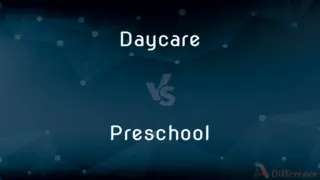Shall vs. Can — What's the Difference?
Edited by Tayyaba Rehman — By Fiza Rafique — Updated on May 8, 2024
"Shall" suggests obligation or determination in formal contexts, while "can" refers to ability or permission in everyday use.

Difference Between Shall and Can
Table of Contents
ADVERTISEMENT
Key Differences
"Shall" implies a strong sense of intention or obligation, often in formal or legal documents. "Can," on the other hand, indicates the ability or capacity to do something, or permission granted in everyday speech.
"Shall" is used to express a commitment or directive, particularly in legal contracts or agreements. Conversely, "can" expresses the possibility of an action, typically signifying personal ability or external authorization.
"Shall" sometimes offers a suggestion or expectation, as in "Shall we dance?" whereas "can" seeks or grants permission, like in "Can I leave now?"
"Shall" appears more frequently in British English and formal writing to express future actions with intent, while "can" is globally used to denote practical ability or informal permission.
"Shall" is declining in use in everyday language but remains crucial in legal contexts. Meanwhile, "can" is versatile in indicating someone's capacity to complete an action or the potential for something to occur.
ADVERTISEMENT
Comparison Chart
Function
Obligation, determination, suggestion
Ability, permission, possibility
Formality
More formal, legal, or traditional usage
Informal and general use
Questions
Often offers suggestions or invitations
Seeks or grants permission
Region
More prevalent in British English
Used in both American and British English
Future Tense
Indicates strong future intentions
Doesn't indicate intention, just ability
Compare with Definitions
Shall
Expresses determination or obligation.
We shall overcome the difficulties.
Can
Indicates ability or capacity.
I can swim across the river.
Shall
Indicates strong future intent.
The meeting shall start at 9 a.m.
Can
Indicates informal request.
Can you help me with this project?
Shall
Suggests offering or volunteering.
Shall I open the window?
Can
Implies an opportunity.
You can visit the museum for free on weekends.
Shall
Formal directive in legal language.
The tenant shall pay rent on the first day of the month.
Can
Asks for or grants permission.
Can I borrow your book?
Shall
Invitation to consensus.
Shall we agree on the plan?
Can
Denotes possibility or potential.
This job can be challenging.
Shall
Used before a verb to indicate the simple future tense in the first person singular or plural.
I shall sing in the choir tomorrow.
I hope that we shall win the game.
Can
Be able to
He can't afford it
They can run fast
I could hear footsteps
Shall
Used similarly to indicate determination or obligation in the second and third persons singular or plural.
(determination): You shall go to the ball!
(obligation): Citizens shall provide proof of identity.
Can
Be permitted to
You can use the phone if you want to
Nobody could legally drink on the premises
Shall
Used in questions with the first person singular or plural to suggest a possible future action.
Shall I help you with that?
Shall we go out later?
Let us examine that, shall we?
Can
Used to request someone to do something
Can you open the window?
Can't you leave me alone?
Shall
(obsolete) To owe.
Can
Preserve (food) in a can
Sardines and anchovies are worth the extra money if canned in olive oil
Shall
To owe; to be under obligation for.
Can
Dismiss from a job
He was canned because of a tiff over promotion
Shall
To be obliged; must.
Can
A cylindrical metal container
A can of paint
A petrol can
Can
Prison
Our friends will get a year or two in the can
Can
The toilet
She walks in and has to use the can
Can
Headphones.
Can
A woman's breasts.
Can
A usually cylindrical metal container.
Can
An airtight container, usually made of tin-coated iron, in which foods or beverages are preserved.
Can
The contents of such a container
Ate a can of beans.
Can
(Slang) A jail or prison.
Can
(Slang) A toilet or restroom.
Can
(Slang) The buttocks.
Can
(Slang) A naval destroyer.
Can
To seal in an airtight container for future use; preserve
Canning peaches.
Can
(Slang) To make a recording of
Can the audience's applause for a TV comedy show.
Can
To end the employment of; fire.
Can
To put an end or stop to
Canned the TV show after one season.
Told the students to can the chatter.
Can
To solicit cash donations for a charity or other organization such as a club or amateur sports team by holding out a can or other container in a public place.
Can
To know how to; to be able to.
She can speak English, French, and German.
I can play football.
Can you remember your fifth birthday?
Can
May; to be permitted or enabled to.
You can go outside and play when you're finished with your homework.
Can I use your pen?
Can
(modal auxiliary verb, defective) To have the potential to; be possible.
Can it be Friday already?
Teenagers can really try their parents' patience.
Animals can experience emotions.
Can
Used with verbs of perception.
Can you hear that?.
I can feel the baby moving inside me.
Can
To know.
Can
To seal in a can.
They canned air to sell as a novelty to tourists.
Can
To preserve by heating and sealing in a jar or can.
They spent August canning fruit and vegetables.
Can
To discard, scrap or terminate (an idea, project, etc.).
He canned the whole project because he thought it would fail.
Can
To shut up.
Can your gob.
Can
To fire or dismiss an employee.
The boss canned him for speaking out.
Can
To hole the ball.
Can
(transitive) To cover (the fuel element in a nuclear reactor) with a protective cover.
Can
A more or less cylindrical vessel for liquids, usually of steel or aluminium, but sometimes of plastic, and with a carrying handle over the top.
Can
A container used to carry and dispense water for plants (a watering can).
Can
A tin-plate canister, often cylindrical, for preserved foods such as fruit, meat, or fish.
Can
A chamber pot, now a toilet or lavatory.
Shit or get off the can.
Bob's in the can. You can wait a few minutes or just leave it with me.
Can
Buttocks.
Can
(slang) Jail or prison.
Bob's in the can. He won't be back for a few years.
Can
Headphones.
Can
(archaic) A drinking cup.
Can
(nautical) A cube-shaped buoy or marker used to denote a port-side lateral mark
Can
A chimney pot.
Can
An E-meter used in Scientology auditing.
Can
An ounce (or sometimes, two ounces) of marijuana.
Can
A protective cover for the fuel element in a nuclear reactor.
Can
An obs. form of began, imp. & p. p. of Begin, sometimes used in old poetry. [See Gan.]
With gentle words he can faile gree.
Can
A drinking cup; a vessel for holding liquids.
Fill the cup and fill can,Have a rouse before the morn.
Can
A vessel or case of tinned iron or of sheet metal, of various forms, but usually cylindrical; as, a can of tomatoes; an oil can; a milk can.
Can
To preserve by putting in sealed cans
Can
To know; to understand.
I can rimes of Rodin Hood.
I can no Latin, quod she.
Let the priest in surplice white,That defunctive music can.
Can
To be able to do; to have power or influence.
The will of Him who all things can.
For what, alas, can these my single arms?
Mæcænas and Agrippa, who can most with Cæsar.
Can
To be able; - followed by an infinitive without to; as, I can go, but do not wish to.
Yet he could not but acknowledge to himself that there was something calculated to impress awe, . . . in the sudden appearances and vanishings . . . of the masque
Tom felt that this was a rebuff for him, and could not but understand it as a left-handed hit at his employer.
Can
Airtight sealed metal container for food or drink or paint etc.
Can
The quantity contained in a can
Can
A buoy with a round bottom and conical top
Can
The fleshy part of the human body that you sit on;
He deserves a good kick in the butt
Are you going to sit on your fanny and do nothing?
Can
A plumbing fixture for defecation and urination
Can
A room equipped with toilet facilities
Can
Preserve in a can or tin;
Tinned foods are not very tasty
Can
Terminate the employment of;
The boss fired his secretary today
The company terminated 25% of its workers
Common Curiosities
Can "shall" and "can" be used interchangeably?
No, "shall" often conveys obligation or intent, whereas "can" indicates ability or permission.
Is "shall" used for invitations?
Yes, "shall" can offer invitations or suggestions, as in "Shall we go to the park?"
Does "can" have formal uses?
Yes, "can" is also used in formal contexts to denote permission or possibility.
What is the typical context for using "shall"?
"Shall" is typically used in formal settings, legal documents, and contracts to convey obligations or commitments.
Can "shall" denote ability?
No, "shall" usually signifies determination, commitment, or obligation rather than ability.
How does "shall" function in questions?
In questions, "shall" often proposes suggestions or seeks agreement, as in "Shall we start dinner?"
Is "shall" used in American English?
It's used, especially in legal contexts, but less frequently in everyday conversation.
How does the use of "can" vary internationally?
"Can" is universally understood and used similarly across English-speaking countries, although informal permissions might be phrased differently depending on cultural nuances.
Are there any exceptions where "can" is used formally?
Yes, "can" can appear in formal requests or permissions, such as in business or official communications.
Why is "shall" considered more formal than "can"?
"Shall" is associated with formal English and legal language, where precision and obligation are crucial, unlike the more versatile and conversational "can."
In what scenarios is "can" most commonly used?
"Can" is commonly used in everyday conversations to discuss one's ability to do something or to request or grant permission.
Can "can" imply certainty in a situation?
"Can" typically implies possibility rather than certainty, focusing on what is feasible rather than what is definite.
What are the implications of using "shall" in legal texts?
In legal texts, "shall" usually mandates an action, implying a requirement or an unavoidable duty.
Is it appropriate to use "shall" in casual conversation?
While not incorrect, using "shall" in casual conversation might sound overly formal or archaic to some listeners.
Why might one choose "shall" over "can" in a directive?
Choosing "shall" over "can" in a directive ensures the language of obligation is clear, emphasizing that the action is not optional.
Share Your Discovery

Previous Comparison
Imidazole vs. Triazole
Next Comparison
Analyze vs. InvestigateAuthor Spotlight
Written by
Fiza RafiqueFiza Rafique is a skilled content writer at AskDifference.com, where she meticulously refines and enhances written pieces. Drawing from her vast editorial expertise, Fiza ensures clarity, accuracy, and precision in every article. Passionate about language, she continually seeks to elevate the quality of content for readers worldwide.
Edited by
Tayyaba RehmanTayyaba Rehman is a distinguished writer, currently serving as a primary contributor to askdifference.com. As a researcher in semantics and etymology, Tayyaba's passion for the complexity of languages and their distinctions has found a perfect home on the platform. Tayyaba delves into the intricacies of language, distinguishing between commonly confused words and phrases, thereby providing clarity for readers worldwide.















































